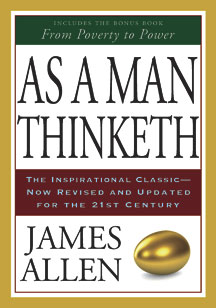|
|
|
Working From the Inside Out
by James Allen
The Book of Proverbs (23:7) proclaims, “As a man thinketh in his heart so is he.” This adage reaches out to every condition and circumstance of human endeavor. Each of us is literally what we think, our character being the complete sum of all our thoughts.
As the plant springs from, and could not be without, the seed, so every one of our acts springs from the hidden seeds of thought, and could not have appeared without them. This applies equally to those acts called “spontaneous” and “unpremeditated” as to those that are deliberately executed. 
Action is the blossom of thought, and joy and suffering are its fruits; thus do we garner in the sweet and bitter harvest of our own plantings. We are what we think we are. If our mind has evil thoughts, we will suffer pain; if our thoughts are pure, joy will follow.
Human growth is a natural phenomenon and not a creation by artifice. Cause and effect is as absolute and undeviating in the hidden realm of thought as in the world of visible and material things. A noble and God-like character is not a thing of favor or chance, but is the natural result of continuous effort and right thinking, the effect of long-cherished association with God-like thought. An ignoble and bestial character, by the same process, is the result of the continued harboring of groveling thoughts.
We are made or unmade by ourselves. By our thoughts, we forge the weapons by which we can destroy ourselves. Likewise, we also fashion the tools with which we build for ourselves heavenly mansions of joy and strength and peace. By the right choice and true application of thought, we ascend to the Divine Perfection; by the abuse and wrong application of thought, we descend below the level of the beast. Between these two extremes are all the grades of character. We are our own maker and master.
Of all the beautiful truths pertaining to the soul which have been restored and brought to light in this age, none is more gladdening or fruitful of divine promise and confidence than this—that we are the masters of thought, the molders of character, and the makers and shapers of condition, environment, and destiny.
As a being of Power, Intelligence, and Love, and the lord of our own thoughts, each of us holds the key to every situation, and contains within ourselves that transforming and regenerative agency by which we may make ourselves what we will.
Each of us is always our own master, even in our weakest and most abandoned state. However, in a state of weakness and degradation, we become foolish masters and misgovern the “household.” When we begin to reflect upon our condition, and to search diligently for the Law upon which our being is established, we then will become wise masters, directing our energies with intelligence, and fashioning our thoughts to fruitful issues. Such is the conscious master, and we can only thus become by discovering within ourselves the laws of thought; which discovery is totally a matter of
application, self-analysis, and experience.
Only by such searching and mining are gold and diamonds obtained, and we can find every truth connected with our being if we will dig deep into the mine of our soul; and that we are the maker of our own character, the molder of our own life, and the builder of our own destiny. We may unerringly prove, if we will watch, control, and alter our thoughts, tracing their effects upon ourselves, upon others, and upon our life and circumstances. By linking cause and effect by patient practice and investigation, and utilizing every experience, even to most trivial, every-day occurrence, we will obtain that knowledge of ourselves which is Understanding, Wisdom, and Power. In this direction, as in no other, is the law absolute: That we will find what we seek for only by patience, practice, and ceaseless importunity. In this way can we enter the door of the Temple of Knowledge.
Excerpted from As a Man Thinketh, by James Allen, originally published in 1902. Revised and updated by Arthur R. Pell, Ph.D., © 2008, Tarcher/Penguin. www.penguin.com. Born in Leicester, England, in 1864, James Allen wrote 19 popular words of inspiration before his death in 1912.
|

